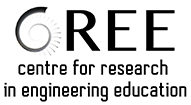
Engaging in a postgraduate programme in Engineering Education for many of our students implies a transition from the relatively narrow perspective of the disciplinary specialisation of engineering to the broader, multidisciplinary perspectives and practices of engineering education scholarship. It also often involves a transition from a quantitative research paradigm to a qualitative or mixed methodology paradigm. The successful negotiation of this transition tends to be a transformative development process. This programme is designed to facilitate such developmental processes via our structured postgraduate program in Engineering Education.
MPhil
The MPhil degree in Engineering Education may be completed as either: (i) a full dissertation worth 180 National Qualifications Framework (NQF) credits, or (ii) 60 NQF credits of coursework and a supervised dissertation equivalent to a further 120 NQF credits. The dissertation should incorporate any or all of the following: design of an engineering education research project involving advanced concepts and theoretical principles located in the engineering education research field; a research project of a theoretical or practical nature; a critical review of a specified topic based upon a comprehensive search of the literature or available data, a rigorous analysis of empirical data, and the development. of a coherent discussion of the analysis, or any other study acceptable to the Faculty. Students will register for the dissertation in the home department of their supervisor.
PhD
The PhD in Engineering Education is a research degree on an advanced topic under supervision that adds to new knowledge in the field. It is worth 360 NQF credits and includes the submission of a thesis. Typically PhD students spend their first year auditing the MPhil courses to familiarise themselves with the demands of research in the discipline.
Comparison
|
MPhil (dissertation) |
MPhil (taught) |
PhD |
|
NQF level 9 |
NQF level 9 |
NQF level 10 |
|
180-credit dissertation |
60-credit course work + 120-credit dissertation |
360-credit thesis (which includes non-credit bearing course work) |
|
Year 1: dissertation Year 2: dissertation |
Year 1: course work Year 2: dissertation |
Year 1 audited courses Year 2-4: thesis |
Who should attend?
This programme is open to anyone who wishes to pursue studies in the field of engineering education but will be of particular benefit to those who are currently involved with the education of engineers or will be in the near future. Typically, those applying for the PhD programme would be academic staff members who want to advance their studies. However, PhD candidates who are employed as lecturers struggle to find the time to engage in quality research while managing heavy teaching and administrative loads. In addition, lecturers with their first qualification in engineering or science face the challenge of moving from their disciplinary specialisation into education research. This structured PhD program in Engineering Education addresses these challenges.
Coursework
The programme includes course work consisting of three block release modules. These blocks each consist of a full-time contact week (Mon–Sat) scheduled to fit into the academic year to favour full-time attendance. In addition to these sessions, candidates will be required to undertake assignments and case studies both individually and in groups.
Course 1: Knowledge and Practices in Engineering Education
This course intends to provide postgraduate students with an introduction to conceptual frameworks in teaching and learning as appropriate to engineering education. The aim is to furnish the student with the conceptual tools to enable a critical approach to engineering knowledge and to enable reflection on higher education practice.
To be successful in this course, students will be able to:
- apply theoretical frameworks to engineering education practice;
- reflect critically on own practices with reference to theoretical frameworks;
- identify and describe the principles behind curriculum design decisions;
- understand the different forms of knowledge on which effective engineering educators draw.
Course 2: Methodologies in Engineering Education
This course aims to provide the student with an introduction to methodologies appropriate for research and scholarly work in engineering education. In this course students will engage with philosophy for understanding the world of engineering education, methodologies that can be applied to problems in engineering education, and methods and techniques for engaging with those problems in order to understand, critique, explain and possibly intervene to address them.
To be successful in this course, students will be able to:
- understand selected methodological approaches in engineering education;
- understand the philosophical underpinnings of selected methodologies;
- critically evaluate methodological choices;
- select appropriate methods and techniques that are aligned with selected methodologies;
- understand the ethical implications of methodological choices.
Course 3: Theoretical Foundation in Engineering Education Research
This course intends to provides postgraduate students with an introduction to substantive theories that address key educational concepts. These broad concepts will revolve around the notions of: identity; discourse; knowledge; student experience; social structure.
To be successful in this course, students will be able to:
- demonstrate understanding of key theoretical concepts for framing engineering education in the higher education context;
- evaluate the utility of theories introduced to describe and explain engineering education phenomena;
- critically evaluate engineering education research literature (from a theoretical perspective);
- construct a theoretical argument.
